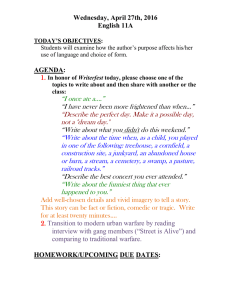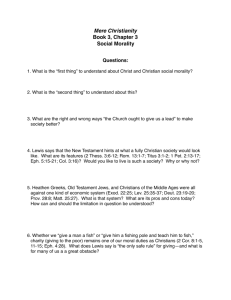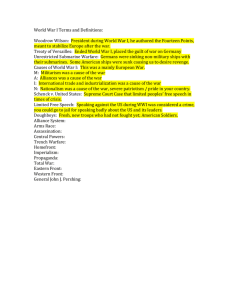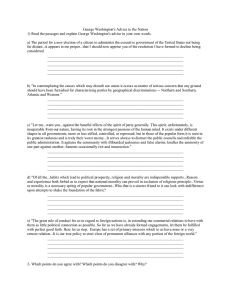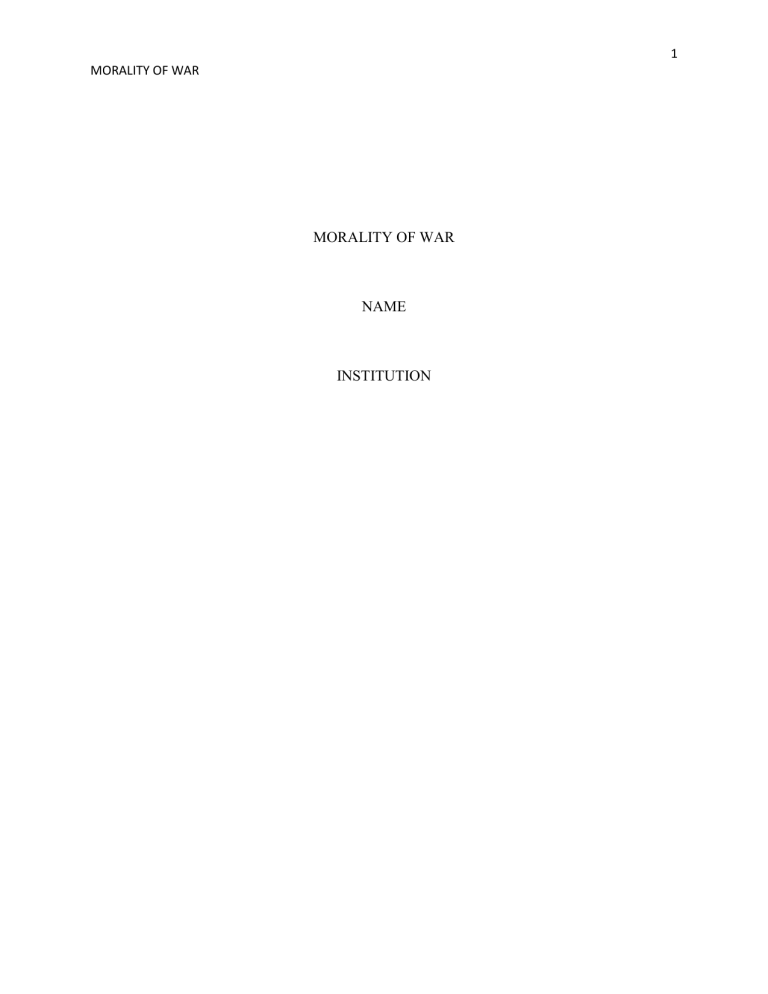
1 MORALITY OF WAR MORALITY OF WAR NAME INSTITUTION 2 MORALITY OF WAR INRODUCTION War and conflicts are anomalous human activities. War is a revulsion, menace of humanity along with famine, death and pestilence. Law ought to be harmonious with morality. Proscriptions and approvals in the law must correspond to the proscriptions and approvals of morality. Foundations of the law stem either directly or concomitantly from the requirements of morality. war is mainly judged whether it morally wrong or right. Warfare is morally justified under some certain circumstances. In warfare some acts, such as destruction and killings are morally justified. Morality in warfare has insinuations for public policy, international law and decision-making in conflict. In some places, religion and faith continuous to be a reagent of warfare. In the Bible, the old testament context views war as holy and initiated by God. In the new testament, warfare is generally regarded as evil and peace was emphasized instead. MORALITY OF WAR The old testament explains warfare as a conflict that was commenced by God. According to the Bible (Exodus 17:16; Numbers 31: 1-3), argues that every conflict and warfare had a religious meaning and significance. Sacrifices were made to appease God for his continuous support during war (1 Samuel 7:8-10; 13:9). The sacred ark of the promise was taken to war to signify God’s presence. Warfare is morally justified as holy war in the old testament as God was fighting to salvage and secure Israel for his own people so as to accomplish his redemptive plan for Israelites. In the current world, the Biblical holy war is compared to Islam Jihad. The old testament warfare is the war that God himself was fighting for his own people unlike the ongoing military strategies that depicts to fight for God. 3 MORALITY OF WAR The Holy war in the Bible, is actually a non-repeatable feat in Israel and the history of the world. In the history of Israel, prophets began to understand the horror of war as God’s sentence against his own people and land because of their sins and evil doings and the glory of washedout (Habakkuk 1:5-11). Later the old testament prohibits war in the book of Isaiah 2:3-4, it argues that God will judge amongst nations and he will settle conflicts for his people. God says that no nation will take up sword against another nation nor will they train for battle against another nation and no blood shed will be spilt. God institutionalizes capital retribution in the case of murder. In Genesis 9:6, God gives a command saying that, a human being that sheds the blood of another human will face death. He gives authority to governments by asking human beings to be subjects to their authorities as power comes from him. Governing authorities are ordained by God. The fundamental tenacity of authorities is to restrain the evils of men and protecting them from outside evils. God expects states to protect themselves from evil forces with and outside its territories that may hurt its innocent people. As in the old testament, God would either allow Israel to win or be defeated in war. God condones warfare where nations protects their citizens and self-interest (Deuteronomy 20:1) for instance, john the Baptist fails to judge a roman soldier for choosing going to war. He rather tells the man to be gratified with his wages. All government and its citizens should be indulged to work towards avoidance of war. In God commandments, the fifth commandment prohibits the destruction of human life intentionally. Warfare breeds injustices and evil that are against the will of God. When there is danger of war, authorities have the necessary powers and legal and competence to defend themselves rightfully once all peace efforts have bored unsuccessful fruits. A rigorous consideration should be made before authentic defense by the military action. Such decisions are 4 MORALITY OF WAR subject to arduous circumstances of moral legitimacy. Damages inflicted by warfare are certain, grave and damaging. Proverbs 21:2 talks about the need to differentiate right intents before engaging in conflicts and warfare. Conquest, destruction, vengeful and pillage are forbidden as reason for war but rather the scriptures advocate for righteousness and justice as honest reasons for self-defense. Battles and war should be undertaken with much sobriety, counsel and reluctance. Psalms 68:30 talks about people who take pleasure in war. Nations that engage in conflicts and war need to do so with abundant sorrow. Given the agony of chastisement, the inescapability of hurting innocent people and the general damages and setbacks to nations is woefully annoyance to God. The only reason for going to war is in protection and defense against aggression. In case of all parties being in agreement, no nations would engage in wars. War should be condemned and prevented by means of moral persuasion. Sometimes it’s hard to prevent war and it involves weaponry that can cause massive destruction. When the reasons to go to war are righteous and moral, then nations must fully engage in war with intense focus and quest for a decisive victory. In the new testament, Jesus said that when you hear sounds and rumors of war, do not be distressed because it must take place and the end has to come (Mark 13:7). In his parables, Jesus talks about war and the use of fierceness. God’s advice and will on ungodly human beings can be misinterpreted and lead to manifestation of evil deeds and intentions. Comparative to the sinful behaviors of human kind, the book of Judges 17:6 speaks of human beings doing what they perceived was righteous in their eyes but in doing so, they sinned. Human beings should wage a conflict that is approved by God according to the principle of righteousness. When a conflict is morally justified, nations should ensure they emerge victorious. 5 MORALITY OF WAR SUMMARY From the bible, war is given the moral authority by God in the old testament as he is the one who initiated it and also supported in the new testament by Jesus. Evil deeds are forbidden and it is righteous to do what is right in the sight of men. Governments and authorities are given the authority from God to protect human kind from both inside and outside evil. In the imperfect universe, conflict and war can be forced on people who do not wish it War should be fought when the reasons are just and morally right.
